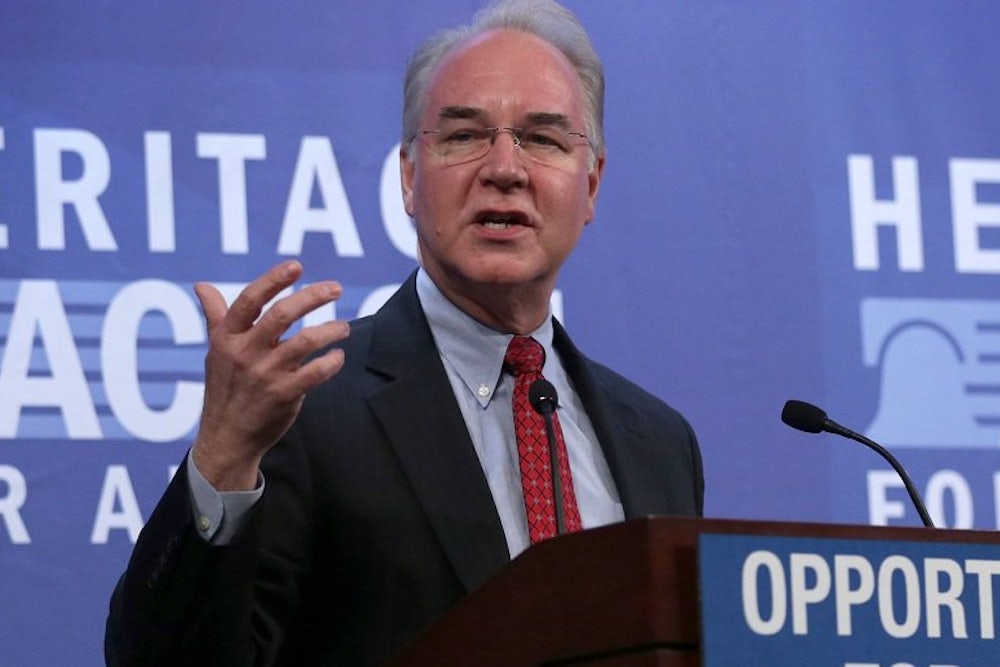In recent years, it has become all but a requirement for Republicans to propose balancing the budget within the next decade. The House GOP budget for the 2016 fiscal year, which was released Tuesday, is no different: House Republicans propose partially privatizing Medicare, block granting Medicaid, and repealing Obamacare in order to cut more than $5 trillion in spending by 2025. If enacted, those cuts would have a disastrous effect on the economy and on the lives of millions of Americans—all in service of a meaningless goal. There’s no reason to balance the budget within ten years, 20 years, or 100 years.
The GOP's commitment to a balanced budget is actually an extremely new development. When Representative Paul Ryan was chairman of the House Budget Committee from 2010 to 2014, his budgets did not always balance. His budget for the 2010 fiscal year, for instance, had a $593 billion deficit in 2019. The 2012 version and 2013 version each had deficits of $391 billion and $287 billion, respectively, at the end of the ten-year budget window.
That changed last year. The Ryan budget for the 2014 fiscal year balanced in ten years, but that timetable had nothing to do with economic policy. Instead, Ryan balanced the budget in ten years so that it appeared in the Congressional Budget Office's legislative score of the proposal, which measures the spending and revenue effects of legislation over a ten-year window. Ultimately, CBO's score is what matters in Washington. Ryan's timetable, thus, is arbitrary. He chose it not based on economic theory but to fulfill CBO's scoring rules.
Representative Tom Price, who took over as the chairman of the House Budget Committee this year, picked up where Ryan left off. In fact, he takes the cuts a step further than Ryan by balancing the budget in nine years. It would slash Medicaid spending by nearly $1 trillion. Repealing Obamacare would save another $2 trillion, although the Republican Party would almost certainly pass a replacement health-care plan that would cost hundreds of billions of dollars. Defense spending would actually increase by nearly $400 billion but that would be more than offset by massive cuts to non-defense discretionary spending. In other words, the budget doesn’t look much different than Ryan's last year.
When Ryan released his budget, however, Republicans only controlled the House; they didn’t have to worry about whether or not the Ryan Budget could pass the Senate. Now Republican leaders in both chambers of Congress must consider the needs of more moderate members of their party. The Senate budget, for example, excludes Medicare privatization to satisfy Republican moderates. And hawks like senators John McCain and Lindsey Graham are determined to increase defense spending above its current levels. It still is expected to balance within ten years. It would be easier to appease these different constituencies if Republicans could run a deficit over the next ten years. But that is no longer acceptable on the right. In other words, the commitment to balancing the budget makes it much harder for the House and Senate GOP to compromise on a budget even among themselves.
What’s a better policy? The budget should instead ensure that the debt, as a percentage of GDP, is on a downward path. Currently, debt is equal to 74.1 percent of GDP, and the Congressional Budget Office projects it will rise to 77.1 percent by 2025. In the short-term, that’s not a very large increase. The often-talked-about debt crisis occurs outside of the CBO’s ten-year budget window when entitlement programs are projected to grow significantly.
There’s no consensus among economists about what downward path the debt should follow over the next ten years. Generally, economists suggest that an annual deficit of 3 percent of GDP is acceptable. One of the requirements of the European Union, for instance, is that countries limit government deficits to 3 percent of GDP (there are frequent exceptions however). Last year, economist Henry Aaron explained in The New Republic why fears over the deficit are overblown.
Of course, policymakers shouldn’t pass a budget that dramatically increases the deficit, except in extreme circumstances (such as after the Great Recession). A responsible budget reduces the deficit to 3 percent and sets the debt on a downward path without massive spending cuts or huge tax increases that hurt millions of Americans and cripple government programs. The president’s budget, which reduces the debt to 73.3 percent of GDP in 2025, fulfills those goals. The House GOP budget, on the other hand, in reducing the debt to 55 percent of GDP would seriously hurt the vast majority of Americans. That's irresponsible.
